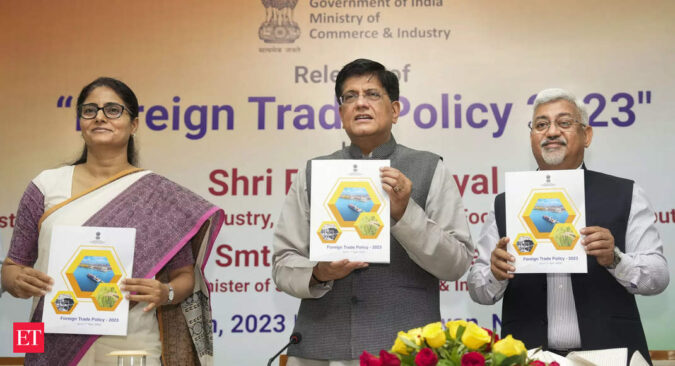The processing facility will be allowed for last-mile activities such as labelling, testing, and repackaging amongst others.
All FTP benefits will be extended to e-commerce exports, and the value limit for exports through courier service is being increased to Rs 10 lakh per consignment, up from Rs 5 lakh.
As per the policy, guidelines will be formulated in consultation with other ministries to facilitate further exports under e-commerce.
The necessary enablement of IT systems in Department of Commerce, Post CBIC will be undertaken in six months.
According to estimates e-commerce exports are expected to grow to USD 200-300 billion by 2030.
As per the policy, Dak Ghar Niryat Kendras will be operationalised throughout the country to work in a hub-and-spoke model with foreign post offices to facilitate cross border e-commerce and also to enable artisans, weavers, craftsmen, MSMEs in the hiterland and landlocked regions to access international markets. The policy also talks about special outreach and training activities for small e-commerce exporters, and handholding through industry and knowledge partners.
Electronics and Computer Software Export Promotion Council (ESC) Chairman Sandeep Narula noted that focus on e-commerce window for exports, stress on setting up a consultative mechanism for addressing concerns of the exporting community, amnesty scheme for one-time settlement of defaults in export obligations, greater engagements with states for export promotion are “welcoming features”.
According to ESC, long-term policy, which would undergo course correction, whenever required, is dynamic and in line with the felt needs of the industry and exporters.
“India needs a critical policy push and heightened commitment of the stakeholders including state governments, industry and exporting community to work towards achieving USD 2 trillion exports by 2030,” Narula said adding that the current pick-up in exports, which is poised to touch USD 765 billion, overshooting the target set by the end fiscal 2023 gives the hope that the target is well within the achievable realm.
ESC observed that on the lines of incentive schemes drawn up for the electronic hardware sector, a similar scheme should be formulated for the software sector, as well.
“Historically, this sector has grown up on its own and there is a case for some targeted incentives for the sector, particularly for the identification of markets and for undertaking R&D efforts,” Narula added.
